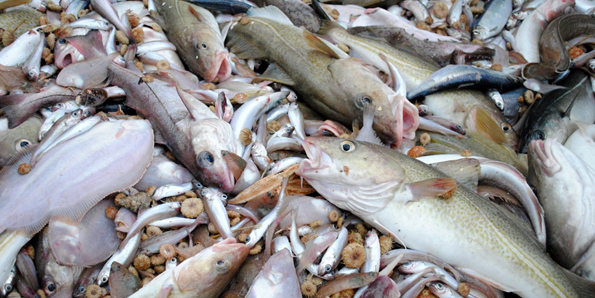FISHDIV
How do cod and climate shape fish biodiversity in large marine ecosystems?

Trawl sample. Photo © Cecilie Kvamme/IMR.
Objectives:
The primary objective is to examine the role of climate and a dominant predator in shaping fish biodiversity over space and time in large marine ecosystems.
Secondary objectives:
- We will examine the impacts on fish biodiversity of intensive exploitation and subsequent reduction of cod, an apex predator on the Scotian Shelf, Northwest Atlantic
- We will examine the effects on fish biodiversity in the Barents Sea, where the cod population has increased both in numbers and distribution over large spatial scales in contrast to many other marine ecosystems
- We will examine how the impacts described above interact with climate change in shaping fish biodiversity
Project summary:
Over-exploitation and collapse of top predators in marine ecosystems are well recognized, but its impact on biodiversity at the ecosystem level is only poorly understood.
On the Scotian Shelf in the Northwest Atlantic the cod population has been dramatically reduced, with a collapse on the eastern shelf in the early 1990s. Preliminary analyses suggest that this has resulted in large changes in the fish biodiversity with increased variability in the bottom fish community. This means that the fish communities were more homogeneous when cod was more prevalent in the system.
In a northern ecosystem, the Barents Sea, the cod population has increased dramatically both in numbers and distribution over large spatial scales, i.e. a rather unique situation for marine ecosystems. The Barents Sea cod population is currently the largest in the world. At the same time, the climate in the Barents Sea has changed during the last decades, with increased sea temperature and declining sea ice. Our predictions are a more homogeneous bottom fish community with an increasing cod population in the Barents Sea. Simultaneously, but working in the opposite direction, our expectation would be increased fish diversity as a consequence of increasing sea temperature.Here we will evaluate the role of the dominant predator cod and climate in shaping fish biodiversity over space and time in large ecosystems.
Through these studies, we aim to provide a new methodological approach that is expected to give an earlier warning on changes in ecosystems than more traditional statistical methods. Obviously, such early warnings are important for the management authorities.
Read more about the project:
The role of apex predators and climate for biodiversity (www.researchmedia.eu)
Publications:
Ellingsen, K.E., Yoccoz, N.G., Tveraa, T., Frank, K.T., Johannesen, E., Anderson, M.J., Dolgov, A.V. & Shackell, N.L. (2020) The rise of a marine generalist predator and the fall of beta diversity. Global Change Biology, 2020;00:1–11.
Ellingsen, K.E., Anderson, M.J., Shackell, N.L., Tveraa, T., Yoccoz, N.G. & Frank, K.T. (2015) The role of a dominant predator in shaping biodiversity over space and time in a marine ecosystem. Journal of Animal Ecology, 84: 1242-1252.
Ingvaldsen, R.B., Bogstad, B., Dolgov, A.V., Ellingsen, K.E., Gjøsæter, H., Gradinger, R., Johannesen, E., Tveraa, T. & Yoccoz, N.G. (2015) Sources of uncertainties in cod distribution models. Nature Climate Change, 5: 788-789.
Bergstad, O.A., Johannesen, E., Høines, Å., Ellingsen, K.E., Lien, V.S., Byrkjedal, I., Yoccoz, N.G., Tveraa, T., Wienerroither, R., Langhelle, G. & de Lange Wenneck, T. (2017) Demersal fish assemblages in the boreo-Arctic shelf waters around Svalbard during the warm period 2007-2014. Polar Biology , 41(1) 125-142.